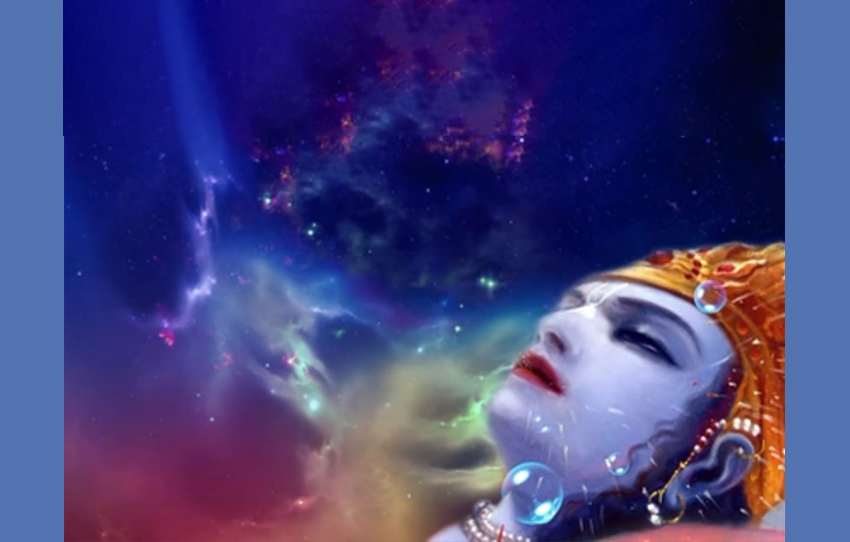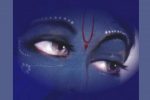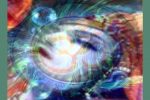NAME 41
Mahāsvanaḥ महास्वनः
The One who has a thunderous voice. His voice is the origin of sound that ultimately manifested as the Vedas. This also goes to prove that He is the Śabdabrahman, the Brahman assuming the nature of sound. At the cosmic level, this is the movement of consciousness that brings forth the universe. This way also, Viṣṇu is said to be the Creator of the universe.
Pure Consciousness is the Brahman and the individual consciousness is the soul. When the individual consciousness realizes the Pure consciousness, it is Self-realisation.
Mahaasvanah – One from whom comes the great Sound.
Embodiment of the Vedas. Brihadaaranyaka Upanishad (Br. Up. 2.4.10) says “Asya Mahato Bhootasya Nishvasita meta drigvedo yajurvedah – The Vedas are the breaths emanating from the Bhagavan”; The Vedas describe Lord’s effulgence and splendour; The Gayatri Mantra also invokes the Supreme Lord Vishnu, who is the principal source of energy for the Sun.
Maha-svanah / He of the venerable sound (of the Vedas).
He who is the possessor of that great ‘sound’ the primeval and eternal universal sound – the transcendental resonance of the eternal Vedas – that Śabdabrahman (शब्दब्रह्मन्)
The Vedas are considered अपौरुषेय, Apauruṣeya (not created by any man) and अनादि, Anādi (eternal) and therefore identifiable with the supreme Brahman – as an inseparable part of him and the प्रमाण, Pramāṇa (testimony) for the Vedas is Śabda and as a corollary Śabdabrahman – and this verbal testimony comes from the supreme being himself and therefore he is the possessor of MAHĀSVANAḤ (the great sound).
The Bṛhadāraṇyakopaniṣad states that the great supreme being (mahatobhUtasya) exhaled (nishvAsitam) the four Vedas out of his own nostril.
“The Vedas are the life-breath as it were of the Paramātmā. If the Paramātmā who has no beginning in time exists forever (without any end in time), then the vedas as his life-breath, are naturally anādi (eternal), as they coexist with him”
Therefore this name Mahāsvanaḥ tells us that the supreme being (Viṣṇu), is the person who is to “be known“ by all the Vedas of and the “subject” of all the Vedas and this is further confirmed in Chapter-15; Verse-15 of the Bhagavad-gītā as well:
सर्वस्यचाहंहृदिसन्निविष्टो
मत्त: स्मृतिर्ज्ञानमपोहनंच |
वेदैश्चसर्वैरहमेववेद्यो
वेदान्तकृद्वेदविदेवचाहम् || 15-15||
sarvasyachāhaṁhṛidisanniviṣhṭo
mattaḥsmṛitirjñānamapohanaṁ cha
vedaiśh cha sarvairahamevavedyo
vedānta-kṛidveda-vid evachāham
I am established (सन्निविष्टो; sanniviṣhṭo) in the hearts of all beings and am responsible for and their source of memory and knowledge (स्मृतिर्ज्ञानम; smṛitirjñānam), and it is I alone who is to be “known” through the Vedas (वेद्यो; vedyo), the subject of and knower of the true meaning of the Vedas (वेदान्तकृद्वेदविदेव; vedānta-kṛidveda-vid).
४१. ॐ महास्वनाय नमः।
41. Om Mahāsvanaay Namah
Mahaasvanah- One who possesses thundering (“mahaa”) voice of compulsion: “Svana” means ‘sound’. One whose ‘call’ is thundered in all hearts, familiarly known as the ‘compelling whisper’ of the Higher. The Lord Who has a Thundering Voice.
Or, Svanam can also mean ‘breath’; and so, the term can mean, ‘He whose great breath is the very Vedas’. “Thus, O Maitreyee, this has been breathed forth from this great Being what we have as Rigveda. Yajurveda” -Brihadaaranyaka Upanishad (4.4.10). In the Spiritual literature of India we often read Vedas described as His breath; He breathed out the Vedas (Nih-svasitam).
INTERPRETRATION GUIDED BY SANT VANI (WORDS OF SAINTS)
Mahāsvanāḥ
The one with the great (adorable or venerable) sound.
The Lord is known as Mahāsvanāḥ – the one with the mahānpujitāḥsvanāḥ, the great, adorable or venerable sound, because it is from Him that the Rk, Yajus, Sāma and Atharvana Vedas have come. The Veda, that is, the śrutī is the most sacred. It is in the form of śabda and hence it is referred to here as svanāḥ.
The Brhadāranyakopanisad says that the entire Veda is His breath. The entire Veda is likened to His breathing, because He created the Vedas, anāyāsena, as effortlessly as breathing. This reveals the sarvajñatva, the all-knowing nature of the Lord, because He is śāstrasyaapiyonih, the cause for even the shastras.
The Shastras reveals everything, including the Lord, and that śāstra is revealed by the Lord. There is no other way to know the Lord. If we follow the process of logic, every creation presupposes a creator but given the variegated nature of the jagat, are there many creators or one? This question cannot be resolved by inference. Śankarācharyā mentions in the adhyāsabhāsyā that the construction of a big palace implies the contribution of many doers – architects, masons, carpenters, plumbers so on and so forth. Does the jagat have many creators? That the Lord is one and in fact all that is here is the Lord is revealed by the shastras. This is not a matter of belief but a fact to be understood. Belief needs verification and so if we ‘believe’ in God, our faith will falter from time to time. And it needs to be protected. However if it is faith rooted in true knowledge and own experience it is not something that is prone to faltering.
On the other hand, just like inference is a valid means of knowledge, when I start to see the scriptures as a valid means of knowledge, to tell me what I cannot figure out, my understanding starts to shift. All knowledge rests in a conscious being. The being is consciousness is all knowledge. This being so, you are also all knowledge because you are consciousness.
The Vedas says, ‘you are all knowledge;’ but, one finds that he is not omniscient. This is because that though the jiva is all knowing Isvara, he is inhibited by ignorance. Whereas, the Lord has no ignorance about Himself or about anything else. All knowledge is vested with Isvara.
Whatever is revealed is the knowledge of Isvara. Therefore, finally it is Isvara who is the revealer of everything, especially the Veda, which talks about things that we cannot figure out. The body of knowledge called the Veda, was given out by Isvara to the rishis as transcendental knowledge revealed in meditation and they in turn, gave out this knowledge. So, it is a knowledge that was revealed by Isvara.
Origin of Vedas
Yajurved 31.7 clearly states that Rigveda, Yajurveda, Samaveda and Atharvaveda were originated from Him – the ultimate Ishwar who is omnipresent.
Atharvaveda 10.7.20 reiterates the same essence beautifully. It says that Rik, Yajuh, Sama and Atharva originated from the ultimate Ishwar. It asks “Which deva (provider ofbliss/knowledge) gave the Vedas?” And answers that the One who is controlling and maintaining the entire universe is the creator of Vedas. Atharva is like the mouth of that Ishwar, Samaveda is like the hair on the skin, Yajurveda is akin to the heart and Rigveda is the Prana or source.
Shatpath Brahman 14.5.4.10 states that Ishwar, who is present even beyond the Akash/Sky created the Vedas. The way breath goes out of body and then comes in, during inception of creation, Ishwar creates the Vedas and illuminates the world, and in the phase of dissolution (Pralay), Vedas no more remain in world. However just as a sapling remains inside the seed, Vedas still remain in knowledge of Ishwar, unchanged.
Shankaracharya writes in commentary on Geeta 3.15 that Vedas are actually never created or destroyed. They merely get illuminated and de-illuminated but remain in Ishwar.
Rigveda 10.190.3 states that the creation remains same in all cycles and hence even the constitution of the creation – the Vedas – also remain exactly the same.



